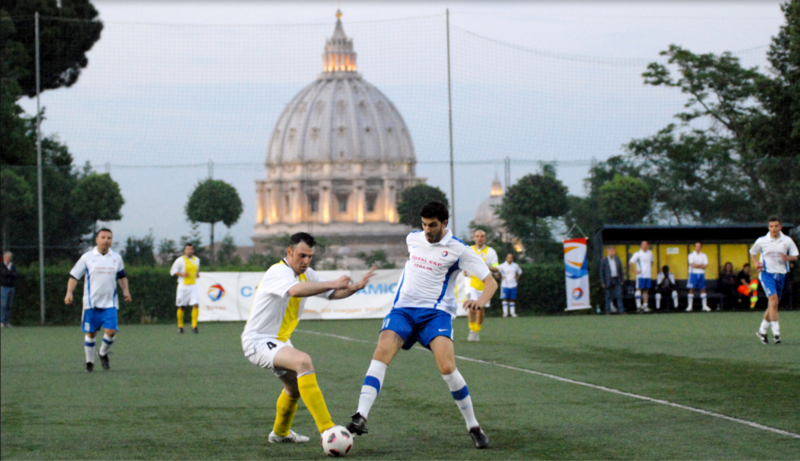Giovanni Trapattoni once coached Vatican City’s national team
The women’s national team launched last year with Pope Francis’s blessing
The Clericus Cup is a mini World Cup for clergymen around Vatican City
Covering an area of less than half a square kilometre, and with a population of barely 900, Vatican City, the seat of the Roman Catholic Church, is the world’s smallest sovereign state. It is hard to find anywhere else in the world with a greater concentration of artistic masterpieces per square metre.
There is more to Vatican City, however, than religion and art. Its sovereign is the football-loving Pope Francis and, though one of the few sovereign states in the world that is not a FIFA member, it boasts a thriving football scene. It might surprise you to learn that it is home to no fewer than eight amateur clubs, and men’s and women’s national teams, while also running three annual club competitions as well as a the Clericus Cup, its own mini World Cup, that takes place every year.

Over five centuries of football
Goals were celebrated in the Vatican as far back as the 16th century. On 7 January 1521, and with Pope Leo X looking on, the then Papal States organised a Florentine football match – an early form of the game that is still played in Italy and from which modern-day football and rugby originated.
The modern game reached Vatican City shortly after World War II, and it hosted its first tournament in 1947: a four-team competition between sides made up of employees of the Holy See, but which had to be suspended when fighting broke out between the players and spectators. Formed by the staff of the Vatican Museums, the first club was founded in the mid-1960s, and in 1972 the inaugural league championship was held, with seven teams taking part.
Three annual tournaments
The league championship is currently contested by eight clubs, whose players work in the Holy See. As well as the league title, they also play in a cup competition. The winners of the two trophies face off in the Super Cup, founded in 2007.
The Vatican City’s clubs:
Musei Vaticani
FC Guardia
DirTel Team
Pont. Univ. Lateranense
Archivio Segreto
Dirseco
Fortitudo 2007
Rappresentativa OPBG (Ospedale Pediatrico Bambin Gesù)

Did you know?
St Peter’s Basilica and Square account for 20 per cent of Vatican City’s territory alone and all its football competitions are held outside its boundaries, though not too far away. Matches are usually played at the nearby Campo Cardinale Francis Joseph Spellman, which offers excellent views of the dome of St Peter’s.
Playing for the Pope’s XI
The Vatican City Football Association was founded in 1972 and now runs a men’s national team, which played its first official match in 1994, and a women’s national team, which came into being last year thanks to the support of Pope Francis. Both sides are coached by Gianfranco Guadagnoli and wear the same distinctive Vatican colours of white and yellow.
None of the national team players have Vatican nationality, so to speak. The squads are made up of Vatican employees and their relatives. The men’s team, which was once coached by none other than Giovanni Trapattoni, has a fascinating rivalry with Monaco’s national team. The two sides have faced off on several occasions over the years, with Vatican City yet to win a game. The women’s national team made their official debut against Italian first division side Roma on 26 May 2019, a match they lost 10-0.
The Clericus Cup
As well as domestic club tournaments and national team football, Vatican City also organises a mini World Cup for priests and seminarians. Founded in 2007, the Clericus Cup is contested by 16 teams from Rome’s seminaries and ecclesiastical colleges, formed by players from all over the world.
More than 70 nations were due to be represented by 330 seminarians at the 14th Clericus Cup, which should have started on 8 March. However, like most other sporting competitions around the world, it was postponed as a result of the COVID-19 pandemic.
It remains to be seen if the tournament will be played later this year. The 2019 winners were the African seminarians of the Collegio Urbano, the fourth time the so-called ‘Lions of Africa’ have won the competition.

This article is part of ‘The Global Game’ series which focuses on football away from the spotlight. Next week we look at football in Macau.